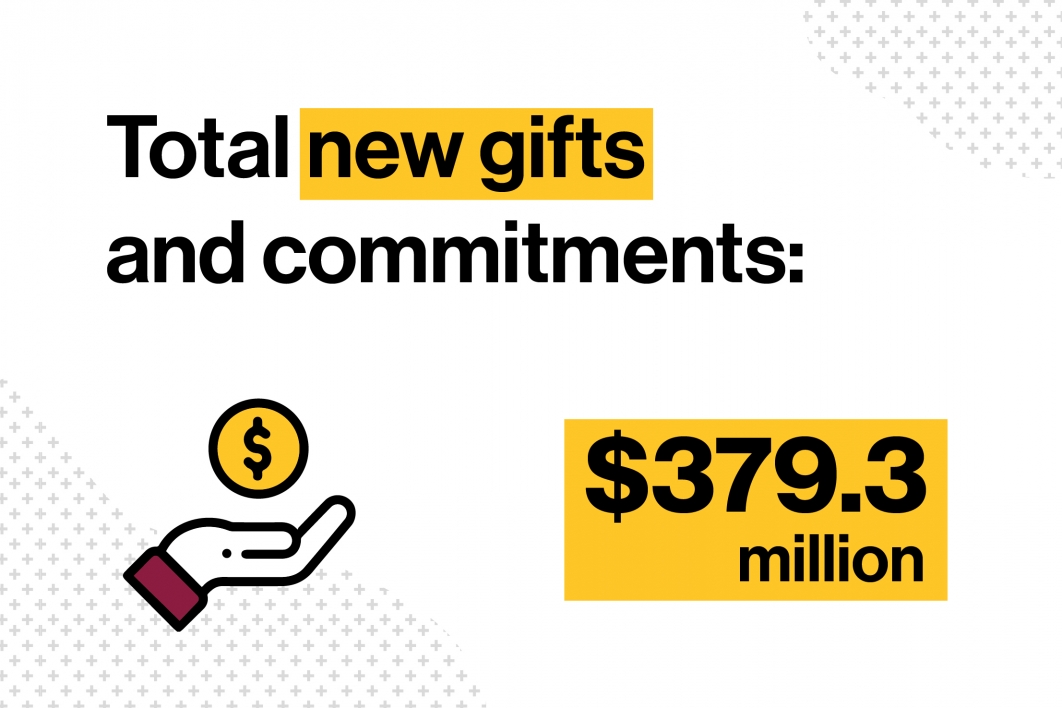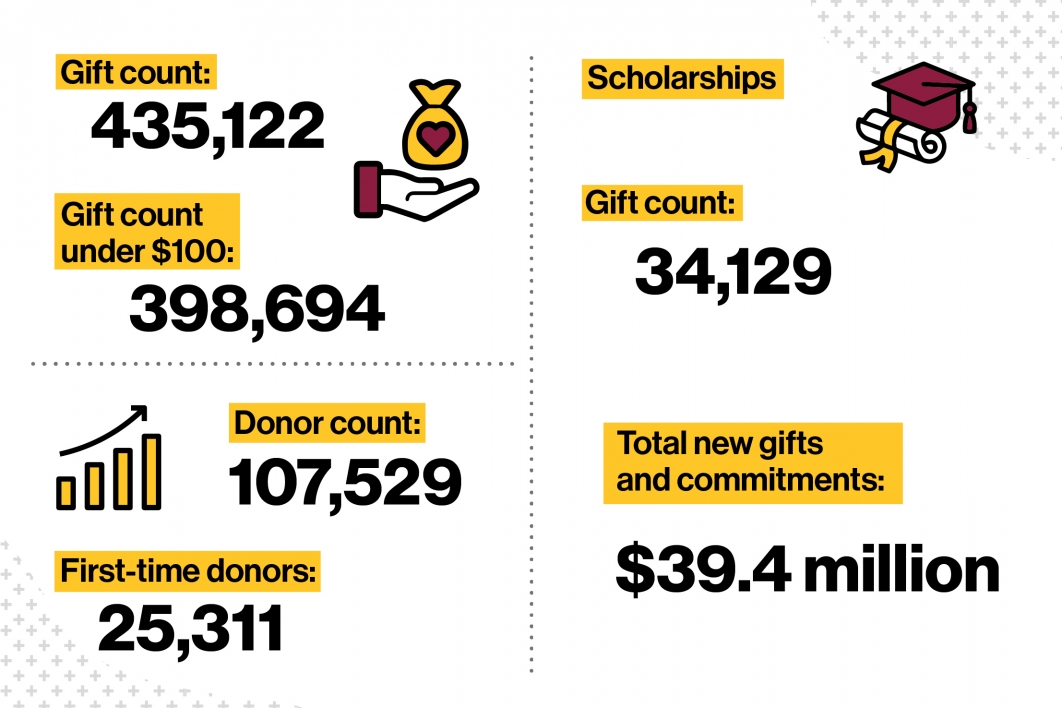Philanthropy to ASU fuels research, academics, opportunities in FY23

Photo of ASU West campus by Charlie Leight/ASU News
Arizona State University students, faculty, academic programs and research will benefit from the philanthropy of 107,529 individual, corporate and foundation donors.
The ASU Foundation for A New American University raised more than $379.3 million in new gifts and commitments for the ASU community during fiscal year 2023, which ended June 30.
In total, there were more than 435,000 gifts to support ASU, 92% of which were under $100.
“We’re extremely appreciative of donors’ generosity to support ASU, its people and its charter,” ASU Foundation CEO Gretchen Buhlig said. “Every gift — large or small — can change futures for ASU students, faculty and the community members who benefit from ASU research and programs.”
The ASU endowment reached $1.47 billion at the end of the fiscal year and provides continuing payments to the university for student scholarships and fellowships, academic programs and research, faculty professorships, directorships and chairs, Sun Devil Athletics and other restricted uses. The endowment posted returns of 10.1%, 9.0% and 7.6% for the trailing three-year, five-year and 10-year periods, outperforming the investments’ strategic benchmark return of 6%–7% for each of those periods.
The endowment is managed by the ASU Foundation and is comprised of more than 2,000 individual accounts that are restricted by donors to a specific use and paid out to the university on a distribution schedule.
“Beyond the strong performance, most importantly, the endowment’s payout to ASU has grown exponentially in recent years and provides a stable and reliable payout to the university that isn’t affected by donor giving trends and market conditions, which enables ASU to make long-term plans to advance its charter and grow,” Chief Investment Officer Jeff Mindlin said.
The ASU Foundation is a private, nonprofit organization that raises and manages private contributions for ASU to ensure as many people as possible have a chance at a better life through its resource-raising efforts.
Student scholarships
Student scholarships remain an important passion for ASU donors. More than $39.3 million was raised to support student scholarships.
The Canon Solutions American Environmental Equity Scholarship was established in fiscal year 2023 to empower undergraduate and graduate students to lead environmental stewardship efforts and preserve the national environment.
“The best way for us to make a genuine, lasting impact is to provide for students who will one day be leading the fight for environmental safety,” said Krystal Bird, associate director of strategic partnerships at ASU. “The students who are focused on confronting environmental issues, especially those which impact marginalized communities, are those we want to award with this scholarship.”
Karen Simon, an alumna of the Thunderbird School of Global Management at ASU and Semester at Sea program, established the Karen J. Simon ’83 Semester at Sea Scholarship that enables Thunderbird undergraduate students to spend a semester living and learning on a ship during a three-continent, multicountry voyage.
The Semester at Sea adventure, paired with her Thunderbird education, led to Simon’s passion for global business and wanderlust. She’s hoping her philanthropic investment will enable other students to benefit from similar opportunities.
“The work of higher education has never been more important to the country than it is today, and at Arizona State University much of it is supported and driven by philanthropy,” ASU President Michael Crow said. “We receive funding from multiple sources, but it is the commitment of our philanthropic donors that powers much of our ability to advance research to address global challenges and provides scholarships that expand access to education globally. It is also philanthropy that helps create faculty chairs for academic units and expand enrichment opportunities for both student and faculty.
"We are grateful beyond measure to our donors and to the work of the ASU Foundation that provides the support to make this happen."
Philanthropy for research
Donors supported research focused on the health of humans and the planet during the year.
A $15 million donation from the Dorrance family and the Dorrance Family Foundation is being combined with funding from U.S. Senator Brian Schatz’s office, the Hawaii Division of Aquatic Resources, the National Oceanic and Atmospheric Administration and ASU to help preserve and restore vitality to Hawaii's coral reefs and the health of its coastlines.
Greg Asner, an ASU Julie Ann Wrigley Global Futures Laboratory scientist and director of ASU’s Center for Global Discovery and Conservation Science in Hawaii, and a team of colleagues are leading the research.
"It is our kuleanaKuleana is the Hawaiian word for responsibility. Source: PBS to protect and care for what we love, our coral reefs and the species they harbor, and all of Hawaii,” said Jacquie and Bennett Dorrance in a joint statement in June. “Success in saving our reefs relies on ‘laulima,’ many hands working together. The Dorrance family and the Dorrance Family Foundation hope this investment ignites action and vital funding, and we encourage others to join us in support of this tremendous effort. The time is now.”
The Michael J. Fox Foundation for Parkinson’s Research donated more than $5 million to further ongoing Parkinson’s disease research with Jeffrey Kordower, founding director of the ASU-Banner Neurodegenerative Disease Research Center and the Charlene and J. Orin Edson Distinguished director at the Biodesign Institute at ASU.
ASU received a $750,000 grant from Genentech and Genentech Foundation’s Health Equity and Diversity in STEM Innovation Fund to advance and support research for equitable Indigenous health and well-being.
Angela Gonzales, associate professor in the School of Social Transformation and a health solutions ambassador in the College of Health Solutions, and Nate Wade, assistant vice president of operations for ASU Health and research assistant professor in the College of Health Solutions, are co-principal investigators who will work with Native communities and a team of 30 Native and non-Native faculty.
Giving to athletics
Sun Devil Athletics received $30.5 million from donors. Those gifts are earmarked for facility upgrades and student-athletes’ mental health.
An investment from Mary Massman will establish the Massman Musco Behavioral Health Center at ASU to provide mental and behavioral health support for Sun Devil athletes. The program aims to design and deliver team- or cohort-based psychoeducation, peak performance skills, preventive training and sport psychology in the student-athlete population.
Inasmuch Foundation awarded the Walter Cronkite School of Journalism and Mass Communication a $125,000 grant to fund investigative reporting initiatives, including the Edith Kinney Gaylord Visiting Professor in Investigative Journalism. The visiting professorship in spring 2023 was held by Ken Foskett, who retired from The Atlanta Journal-Constitution after a 32-year career.
In addition to receiving private support, there are about 24,000 gifts totaling $3.5 million from faculty and staff to support passions they care about.
Philanthropy for academic programs
The W. P. Carey School of Business established a new finance lab thanks to the generous support of Schwab Advisor Services, in partnership with the Charles Schwab Foundation.
The Charles Schwab Foundation Financial Access and Research Lab will provide financial access and literacy tools, experiential learning opportunities for students and information for student asset managers, some of whom manage money on behalf of ASU Foundation’s endowment through the Student Investment Management program.
Infographics courtesy ASU Outreach Hub
More Health and medicine

The science of sibling dynamics: Why we fight, how we relate and why it matters
We have Mother’s Day, Father’s Day and even Grandparents’ Day. But siblings? Usually they get a hand-me-down sweatshirt and, with…

New study seeks to combat national kidney shortage, improve availability for organ transplants
Chronic kidney disease affects one in seven adults in the United States. For two in 1,000 Americans, this disease will…

New initiative aims to make nursing degrees more accessible
Isabella Koklys is graduating in December, so she won’t be one of the students using the Edson College of Nursing and Health…



